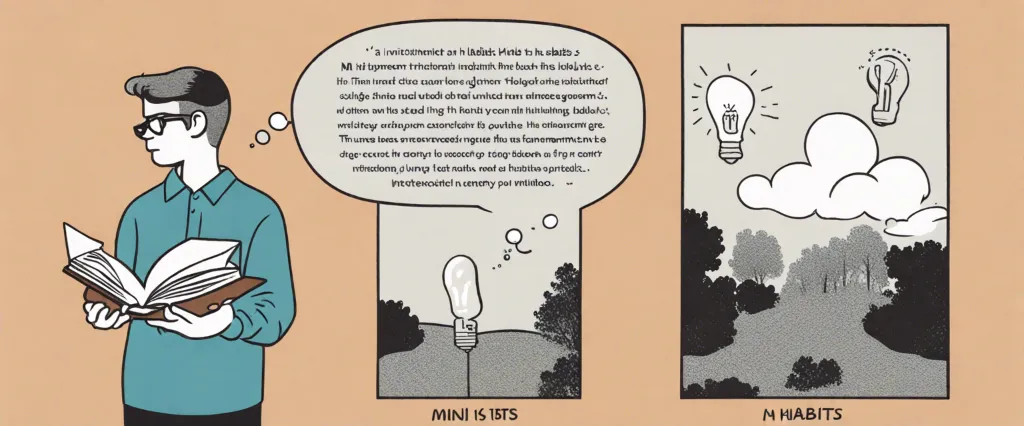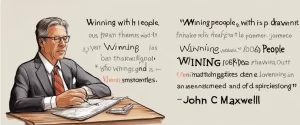——Mini Habits by Stephen Guise & Ready for Anything by David Allen

In the ever-evolving world of personal development and productivity, countless books have emerged offering valuable insights and methodologies to help individuals optimize their lives. Among the vast array of options, two notable titles have caught the attention of those seeking strategies for self-improvement: “Mini Habits” by Stephen Guise and “Ready for Anything” by David Allen.
Both authors delve into the realm of habit formation and productivity, aiming to assist readers in breaking free from procrastination and achieving their goals. While their approaches may differ, Guise and Allen share a common objective: empowering individuals to take charge of their lives and unlock their full potential. With their unique perspectives and innovative concepts, these writers offer readers a chance to explore different paths towards personal growth.
Mini Habits” by Stephen Guise challenges traditional notions of goal-setting and habit formation by advocating for the power of minuscule actions. Guise argues that establishing small, achievable habits provides a more sustainable and less overwhelming approach to personal change. By embracing this philosophy, Guise suggests that individuals can overcome barriers and unleash powerful transformations in all aspects of their lives.
On the other hand, “Ready for Anything” by David Allen delves into a comprehensive system aimed at enhancing productivity in an increasingly chaotic world. Allen’s renowned “Getting Things Done” methodology serves as the foundation for this book, where he offers practical advice on organizing tasks, managing time effectively, and achieving a state of clarity and control amidst daily demands. Through his systematic approach, Allen guides readers towards a more proactive mindset, reducing stress and maximizing efficiency.
While the goals of Guise and Allen may seem similar at first glance, the means by which they achieve them diverge significantly. Guise’s “Mini Habits” promotes a less-is-more approach, while Allen’s “Ready for Anything” prescribes a structured framework for productivity. A comparative study of these two books presents an intriguing opportunity to delve deeper into the nuances of habit formation, examine different strategies of personal development, and ultimately guide readers towards a path that aligns with their unique preferences and needs.
This study aims to explore the fundamental principles, practical techniques, and real-life applications outlined by Guise and Allen. By critically analyzing these texts side by side, we seek to highlight the strengths and weaknesses of each approach, ultimately empowering readers with a comprehensive understanding of how to cultivate positive habits and increase productivity. Join us on this comparative journey as we uncover the hidden gems within the pages of “Mini Habits” and “Ready for Anything,” searching for the keys to unlocking personal growth and success.
Brief Summary of Two Books
Mini Habits by Stephen Guise
Mini Habits” by Stephen Guise is a self-help book that offers a unique approach to forming positive habits. The book emphasizes the concept of starting small, with mini habits, as a way to overcome resistance and build lifelong habits.
Guise begins by explaining how our brains are wired to resist change, making it challenging to adopt new habits. He argues that setting lofty goals and relying on willpower alone often leads to failure and demotivation. Instead, he introduces the idea of mini habits, which are small, easily achievable actions that require minimal effort.
The author highlights the power of consistency and how even tiny, daily actions can lead to significant changes over time. He provides practical tips and strategies for creating effective mini habits, such as identifying specific triggers, setting clear goals, and celebrating small victories.
Guise also addresses common obstacles people encounter when trying to develop habits, such as lack of motivation, procrastination, and perfectionism. He offers advice on how to overcome these hurdles by leveraging the power of mini habits.
Throughout the book, Guise uses personal anecdotes and real-life examples to illustrate the effectiveness of mini habits. He delves into various areas of life, including health, productivity, learning, and relationships, demonstrating how applying mini habits can lead to improvements in these areas.
In summary, “Mini Habits” is an engaging and actionable book that promotes the idea of starting small and embracing mini habits as a powerful tool for personal growth. By breaking down big goals into tiny actions, Guise encourages readers to develop lasting habits that can transform their lives.
Ready for Anything by David Allen
“Ready for Anything” is a self-help book written by David Allen, the renowned productivity expert and creator of the Getting Things Done (GTD) methodology. In this book, Allen expands on the principles of GTD to provide practical strategies and insights for achieving optimal productivity in both personal and professional aspects of life.
The book is structured as a collection of fifty-two short essays, each addressing a different topic related to productivity and personal effectiveness. Allen covers a wide range of subjects, including time management, stress reduction, decision-making, and fostering creativity.
Drawing from his own experiences and interactions with clients, Allen offers valuable tips and techniques to help readers improve their organization, focus, and overall efficiency. He emphasizes the importance of defining and clarifying personal and professional goals, and suggests strategies to effectively manage commitments and priorities. Allen also provides advice on managing email overwhelm, handling interruptions, and maintaining a clear mind amid the chaos of modern-day life.
What sets this book apart is that each essay stands on its own, allowing readers to skip around and focus on areas that resonate with their current challenges. The bite-sized format makes it accessible for readers to find quick solutions or inspiration whenever they need it.
“Ready for Anything” serves as a comprehensive guide for individuals seeking to enhance their productivity and regain control over their lives. David Allen’s practical wisdom and insights empower readers to become more focused, efficient, and better equipped to handle the demands of an increasingly complex world.
Comparison between Two Books

Similarities in Time Management
Both “Mini Habits” by Stephen Guise and “Ready for Anything” by David Allen emphasize the importance of effective time management in order to achieve personal and professional goals. Here are some similarities between the two books in terms of their approach to time management:
1. Focus on small, consistent actions: Both books advocate for the power of small, actionable steps in managing time effectively. Guise promotes the concept of “mini habits,” which are tiny daily actions that build momentum and lead to larger accomplishments. Allen also stresses the significance of breaking down tasks into manageable actions to stay organized and productive.
2. Prioritization and goal setting: Both authors emphasize the need to prioritize tasks and set clear goals to avoid wasting time on unimportant or low-value activities. Guise encourages readers to identify the most crucial tasks and dedicate their time and energy to them. Allen’s book offers various strategies for setting priorities, such as capturing all tasks, clarifying commitments, and organizing them into actionable steps.
3. Time blocking and scheduling: Both books promote the idea of allocating specific time blocks for different activities. Guise suggests setting aside dedicated time slots for important tasks, while Allen advocates for a comprehensive system of time management, including scheduled reviews, reminders, and calendars, to optimize productivity.
4. Overcoming distractions and procrastination: Both Guise and Allen recognize the challenges posed by distractions and procrastination and offer strategies to overcome them. Guise advises readers to focus on the process rather than the outcome to avoid the pressure that often leads to procrastination. Allen suggests creating a “trusted system” to offload mental clutter and minimize distractions, empowering individuals to make proactive choices about where to direct their attention.
5. Continuous improvement: Both books emphasize the importance of continuous learning and improvement in time management. Guise encourages readers to experiment with different strategies and adapt their habits to optimize their time. Similarly, Allen’s book emphasizes the need for regular reviews and adjustments to maintain an efficient time management system.
Overall, both “Mini Habits” and “Ready for Anything” share a common focus on the significance of small, consistent actions, prioritization, scheduling, and overcoming distractions to maximize time management efficiency.
Divergences in Time Management
Mini Habits by Stephen Guise and Ready for Anything by David Allen are both popular books that aim to help individuals improve their productivity and time management skills. While they share certain similarities, they also have distinct differences in their approaches to time management.
One divergence in the books lies in their overarching philosophy. Mini Habits encourages readers to start small and build momentum by setting small, achievable goals. The author emphasizes that consistent small actions can lead to significant progress over time. On the other hand, Ready for Anything takes a more comprehensive approach, focusing on creating a system to manage all aspects of life and work. David Allen’s methodology involves capturing, clarifying, organizing, reflecting, and engaging with tasks and projects.
In terms of specific time management techniques, Mini Habits prioritizes the concept of minimums. Guise suggests setting small, non-negotiable goals that are easy to achieve every day. By doing so, he argues that individuals develop a positive habit-forming routine. The focus is on consistency and building momentum. In contrast, Ready for Anything provides a range of techniques, such as the “Two-Minute Rule” and the “Weekly Review,” that aim to assist individuals in efficiently processing and organizing their work and personal tasks.
Another divergence is the level of structure and organization presented in each book. Mini Habits offers a more flexible and adaptable approach to time management. It encourages readers to find their own methods and adapt the principles according to their specific needs and preferences. David Allen’s Ready for Anything, conversely, provides a highly structured framework, the Getting Things Done (GTD) system, that offers a comprehensive method of organization and task management.
Furthermore, the books differ in terms of their emphasis on external tools. Mini Habits primarily focuses on internal motivation and day-to-day habits, rather than relying heavily on external tools or technology. Guise emphasizes the importance of mindset and developing intrinsic motivation. On the other hand, Ready for Anything acknowledges the role of external tools, such as calendars, task management software, and filing systems, in facilitating effective time management and organization.
In summary, while both Mini Habits and Ready for Anything seek to improve time management skills, they diverge in their approaches. Mini Habits emphasizes consistency through small, manageable tasks, and allows for flexibility in finding personalized methods. Ready for Anything presents a more structured system, utilizing various techniques and external tools to manage tasks and projects comprehensively.

Conclusion
It ultimately depends on personal preference and what you are looking for in a book. “Mini Habits” by Stephen Guise focuses on the concept of small, sustainable, and manageable habits to bring about long-term change. It provides practical strategies for building new habits and overcoming common obstacles.
On the other hand, “Ready for Anything” by David Allen is a productivity book that builds upon his previous work, “Getting Things Done”. It offers tips and techniques for managing workflow, staying focused, and organizing tasks effectively.
If you are interested in developing habits and making positive changes in your life, “Mini Habits” could be a suitable choice. However, if you are seeking productivity advice and methods for managing your tasks and responsibilities, “Ready for Anything” might be the more appropriate book for you.


